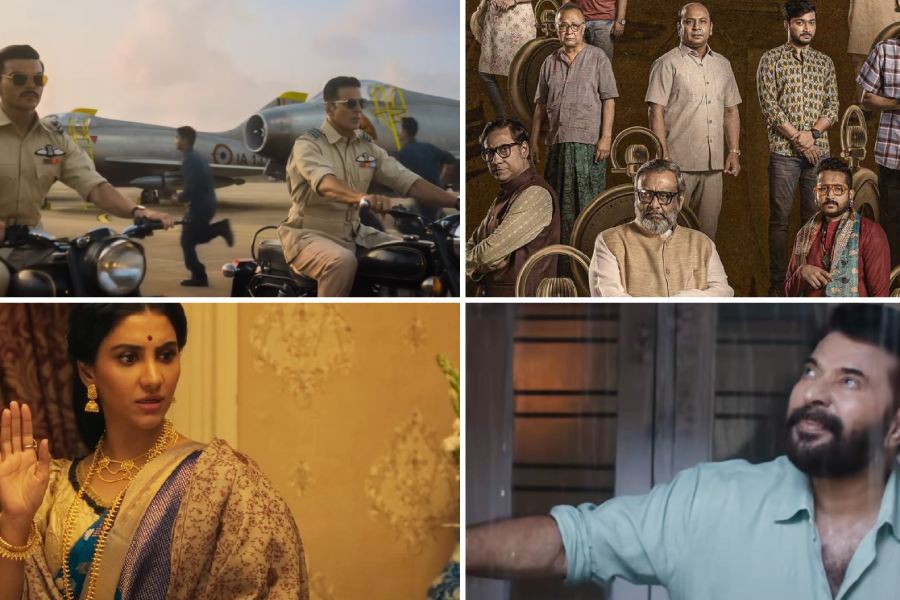 Wednesday, 22 January 2025
Wednesday, 22 January 2025
 Wednesday, 22 January 2025
Wednesday, 22 January 2025
The roar of the crowd at Yves du Manoir Stadium fell to a hush in the 17th minute of the game as the Indian Olympic hockey team faced what seemed an insurmountable challenge. Down to 10 men, squaring off against world No. 2 Great Britain, the odds were stacked against Harmanpreet Singh and Co. The boys, though, had other plans.
Early exchanges set stage for epic battle
The Brits wasted no time asserting their world No. 2 ranking. Their high-press strategy immediately put India on the back foot, resulting in two early penalty corners. India's defence, anchored by the versatile Amit Rohidas, stood firm. Rohidas, showcasing his dual role as defender and first rusher, thwarted these attempts with remarkable skill. India also demonstrated their counter-attack prowess. A moment of individual brilliance saw Abhishek unleash a reverse stick shot, forcing British goalkeeper Ollie Payne into a spectacular save.
Controversial red card shifts the tide
The 17th minute of the match brought a moment that would reshape the entire contest. Amit Rohidas struck William Calnan with his stick. The umpires, after consultation with the video referee, brandished a red card – a rarity in modern hockey.
The controversial decision left India with 10 men for the remaining 43 minutes of the match. In the top global level of any sport, such a handicap would seem unsurmountable. But instead of crumbling, the Indian team rallied together. They knew they had to dig deep and defend for their lives.
Harmanpreet Singh’s thunderous strike
India drew first blood despite being a man down. In the 22nd minute, Harmanpreet Singh, cool as a few cucumbers, rifled a penalty corner into the back of the net. It wasn’t just a goal; it was a statement. With their backs against the wall, India showed they still had the firepower to trouble the best teams in the world. Harmanpreet’s goal gave the team a crucial lead and a much-needed boost of confidence.
Britain strike back: Morton’s equaliser
India’s joy was short-lived. Five minutes later, Great Britain found their equaliser through Lee Morton. A momentary lapse in defence allowed Morton to deflect the ball past a diving PR Sreejesh. Game on.
Sreejesh: The last line of defence
PR Sreejesh, potentially playing in his last Olympic campaign, chose this high-stakes match to deliver the performance of his career, making over 20 saves. His anticipation, positioning, and lightning-fast reflexes frustrated the British attackers time and again. Particularly impressive was his handling of Great Britain's numerous penalty corners.
Tactical brilliance in the face of adversity
Coach Craig Fulton's tactical acumen came to the fore as India adapted to their numerical disadvantage. The team swiftly reorganised their formation, maintaining a compact defensive structure while still posing a threat on the counter. This approach visibly frustrated Great Britain, who, despite their extra man, struggled to break down India's resolute defence. Match statistics painted a clear picture of British dominance in possession and circle entries. India's clinical defending and smart positional play ensured the scoreboard remained unchanged.
The penalty shootout: Test of nerves
The shootout that followed regulation time was a microcosm of the match itself - tense, dramatic, and showcasing individual brilliance. Harmanpreet Singh, Sukhjeet Singh, Lalit Upadhyay, and Rajkumar Pal stepped up for India, each converting their chances with composure and skill. At the other end, Sreejesh, battling through a hurt hamstring, produced two crucial saves against Conor Williamson and Phillip Roper.
There was some controversy too, as befitting a match to savour. Play was briefly halted due to the presence of an iPad near the British goalkeeper. Through it all, India's players maintained their focus, securing a 4-2 shootout victory.
Olympic medal at sniffing distance
India will face either Germany or Spain in the semifinal which will be played on August 6. The dream of a second consecutive Olympic medal is alive and well. Surely, they want to better the Tokyo bronze. After the match, Sreejesh was nonchalant: "Whoever comes in the semis, we will just play our game.” India will be cheering, for sure.







